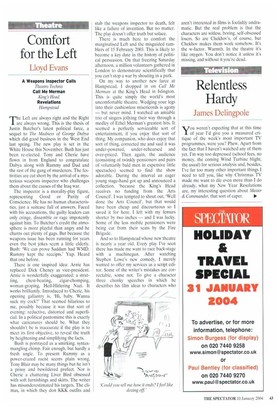Comfort for the Left
Lloyd Evans
A Weapons Inspector Calls Theatro Technis Call Me Merman King's Head Revelations Hampstead
The Left are always right and the Right are always wrong. This is the thesis of Justin Butcher's latest political farce, a sequel to The Madness of George Dubya which did good business in the West End last spring. The new play is set in the White House this November. Bush has just been re-elected. Tony and Cherie have flown in from England to congratulate Dubya along with Rummy and Dad and the rest of the gang of murderers. The festivities are cut short by the arrival of a mysterious weapons inspector who challenges them about the causes of the Iraq war,
The inspector is a morality-play figure, representing Good or Purity of Conscience. He has no human characteristics, just a suitcase full of answers. Faced with his accusations, the guilty leaders can only cringe, dissemble or rage impotently against him. To Butcher's credit the atmosphere is more playful than angry and he churns out plenty of gags. But because the weapons issue has been running for years even the best jokes seem a little elderly. Bush: 'We can prove Saddam had WMD. Rummy kept the receipts.' Yup. Heard that one before.
There is one inspired idea: Arnie has replaced Dick Cheney as vice-president. Arnie is wonderfully exaggerated: a strut ting, chest-beating, cigar-chomping, woman-groping, Heil-Hitlering Nazi. It works brilliantly. Introduced to Cherie, his opening gallantry is, 'Hi, baby. Wanna suck my cock?' That seemed hilarious to me, possibly because it was that sort of evening: reductive, distorted and superficial. In a political pantomime this is exactly what caricatures should be. What they shouldn't be is inaccurate if the play is to meet its first objective, to reveal the truth by heightening and simplifying the facts.
Bush is portrayed as a smirking, syntaxmangling chimp. Fair enough, but hardly a fresh angle. To present Rummy as a power-crazed racist seems plain wrong. Tony Blair may be many things but he isn't a prissy and bewildered prefect. Nor is Cherie a chattering Liver Bird obsessed with soft furnishings and skirts. The writer has misunderestimated his targets. The climax, in which they don KKK outfits and stab the weapons inspector to death, felt like a failure of invention. But no matter. The play doesn't offer truth but solace.
There is much here to comfort the marginalised Left and the misguided ramblers of 15 February 2003. This is likely to become a key date in the history of political persuasion. On that freezing Saturday afternoon, a million volunteers gathered in London to demonstrate scientifically that you can't stop a war by shouting in a park.
On my way to another new farce at Hampstead, I dropped in on Call Me Merman at the King's Head in Islington. This is quite simply the world's most uncomfortable theatre. Wedging your legs into their cushionless misericords is agony — but never mind. I watched an amiable trio of singers jollying their way through a medley of Ethel Merman's greatest hits. It seemed a perfectly serviceable sort of entertainment, if you enjoy that sort of thing. My companion, who does enjoy that sort of thing, corrected me and said it was under-powered, under-rehearsed and over-priced. Then again, the audience (consisting of twinkly pensioners and pairs of voluntarily bald men in expensive little spectacles) seemed to find the show adorable. During the interval an eager young stage-hand got up and announced a collection, 'because the King's Head receives no funding from the Arts Council'. I was tempted to shout out, 'Well done the Arts Council', but that would have been cheap and discourteous so I saved it for here. I left with my femurs shorter by two inches — and I was lucky. Some of the less mobile pensioners were being cut from their seats by the Fire Brigade.
And so to Hampstead whose new theatre is nearly a year old. Every play I've seen there has made me want to race back-stage with a machinegun. After watching Stephen Lowe's new comedy, I merely wanted to offer my services as a script edi tor. Some of the writer's mistakes are correctable, some not. To give a character three chunky speeches in which he describes his film ideas to characters who aren't interested in films is foolishly undramatic. But the real problem is that the characters are witless, boring, self-obsessed losers. •So are Chekhov's, of course, but Chekhov makes them work somehow. It's the w-factor. Warmth. In the theatre it's like oxygen. You don't notice it unless it's missing, and without it you're dead.


























































 Previous page
Previous page